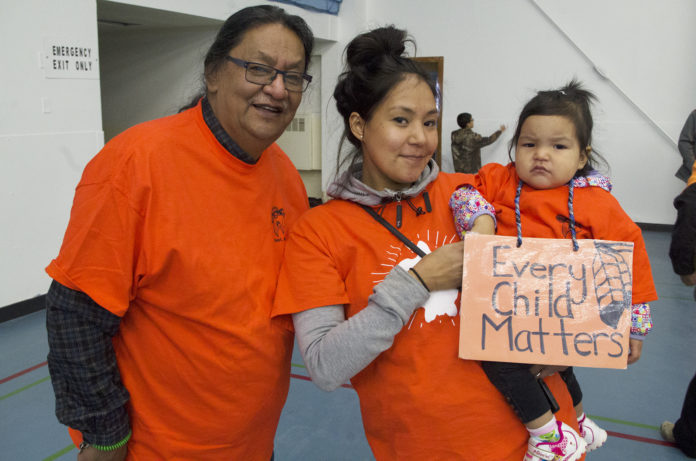
Howard Walker never attended the residential school in B.C. where an orange shirt was taken away from a six-year-old girl named Phyllis Jack, but he has a similar story.
As a young boy heading off to All Saints Indian Residential School (later known as the Prince Albert Indian Residential School) Walker was given a new pair of shoes and a new ribbon shirt. Just like in British Columbia, both were taken from him when he arrived at school. It was an ominous start to what would be a terrible experience.
“They just took everything away (and) disconnected me from my world and put me in another world where I felt a lot of culture shock,” Walker remembered. “Everything was so different, and I was told here that ‘we will teach you how to pray, how to act, how to speak, what to eat, when to eat and everything.’ I was totally controlled…. I felt very stripped.”
Walker survived the three years he spent at All Saints, and a few more at Gordon’s Residential School in Punnichy, but just barely. Gordon’s would become known as one of the more notorious residential schools in the country after William Starr, a teacher at the school from 1968 to 1984, plead guilty to sexually assaulting 10 students in 1993. The government later settled a lawsuit with 230 former students who said Starr abused them. Many former students say Starr was not the only guilty party.
“That was a time that we dreaded, when the Indian Agent would come with the RCMP to the children, to take us away to a residential school,” Walker remembered.
“I think to myself (on) Orange Day, when the RCMP came with the Indian Agent to take me away, where was he when I was going through all these abuses? Where was he? We had nobody to tell and we were too young to defend ourselves.”
Walker’s path to recovery was a long one. He became an alcoholic, struggled to hold down a steady job and eventually was taken in by a kindly old Ukrainian woman who helped him get back on his feet. Today he is sober, happy and healthy, except for deafness in one ear, a result of being smacked in the head repeatedly with a Bible for failing to properly recite the Lord’s Prayer.
Although Orange Day brings back some bad memories for Walker, it also brings hope.
“Orange Day brings out how to have that reconciliation, of perhaps us trying hard to mend something that has been broken,” he said. “An elder told me, if you don’t have forgiveness in your heart, it’s going to become a stone … and you’re not going to be able to move on in life as you should.”
Walker isn’t the only one who shares that sentiment. On Sunday, residents from across Prince Albert gathered at the Senator Allen Bird Memorial Centre for an Orange Shirt Day ceremony to remember residential school victims.
The day is full of sadness, especially when remembering the untold number of students who died while attending those schools (the federal government stopped tracking student residential school deaths around 1920). However, there is also hope that what was broken can be repaired and restored.
“It is kind of emotional for me,” said George Mirasty, a resolution support worker with health Canada who helped organize Sunday’s event. “Seeing all these young children here with their parents, that’s good to see because when I was (in school) we never had that. When I was here, it’s nothing compared to what I see now. That’s emotional for me, to see the children.”
Like Walker, Mirasty attended residential school in Prince Albert. He feels a heaviness when he thinks and talks about the experience, and said the main goal now is to ensure the next generation doesn’t suffer a similar fate. To be successful, that means making sure the stories of past students get told. It also means inviting ministers and other representatives from churches who helped run residential schools to, in Mirasty’s words, “close the gap” between the churches and survivors.
“It still affects us,” he said. “Some are still lost because of those things that still happened in those residential schools. We’ve even got a minister here to try and close that gap between the churches and residential school (survivors). Some of us have adopted the Christian way, and some of us that were in residential school have gone back to our cultural ways. What I’d like to see happen is no more divisions among our people, for all Canadians to get along.”
Mirasty said that’s going to take a lot of slow, painful work. There will be many tears and overwhelming emotion. But he said the fact that an event like Orange Shirt Day can even take place is a sign that those divisions are starting to heal.
The first Orange Shirt Day was held in 2013 in Williams Lake, B.C. by the Orange Shirt Society. The society is a non-profit whose goal is to support residential school reconciliation and create awareness of the inter-generational impact of the residential school system.

